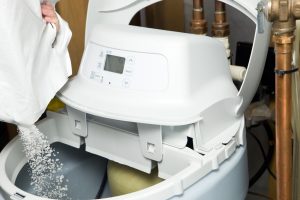Our area of the country tends to have hard water with higher mineral content. Chestermere gets its water from natural areas that are higher in certain minerals compared to other areas. Your source of water may range from moderately hard to very hard, meaning that your water has a concerning number of minerals.
That’s why you need to consider water softeners in Chestermere to help improve your residential water quality. You can keep reading to learn more about how water softeners work and why you might need one for your home. Then you can give our team a call to schedule your in-home assessment to get water quality testing done and decide if a water softener is right for your family.
What Is Hard Water?
Having hard water means that your water has a high mineral content. Calcium and magnesium are examples of two minerals that are found in drinking water. In low concentrations, they aren’t concerning at all. But having hard water means that levels are high enough to pose risks to your home’s appliances and plumbing system.
Hard water can range from being low risk to very high risk. The only way to know the water quality of your home is by having our team conduct a test to find out the level of minerals found in your home’s water. The test is as easy as taking water samples from around your home and then sending the collection to a lab for assessment. From there, we can talk to you about the different particles found in your water and what your options are for addressing hard water.
Risks of Hard Water
You may be wondering what the big deal is about minerals being in your water. Generally speaking, having hard water doesn’t pose any health risks. The minerals that contribute to making water hard are also found in many foods. However, there may be other particles in your water that pose risks to your family’s health.
Plus, the minerals in hard water are very abrasive. They can do a lot of damage to your home’s plumbing system, fixtures, and even the appliances in your home that use water. The abrasiveness can cause corrosion and lead to parts wearing down much quicker than they would otherwise. You may find that you have to replace plumbing fixtures or appliances more often when you have water with high mineral content.
How a Water Softener Works
A water softener works by using resin beads to attract the minerals in hard water and absorb them so they do not pass through and enter your home. The resin beads then go through a brine tank that is filled with salt to transfer the hard water particles away. The resin beads cycle back into the tank to repeat the process of absorbing hard water minerals again.
Contact Ace Plumbing and Heating today to schedule an appointment for your plumbing and HVAC needs. Happy Today or You Don’t Pay!

